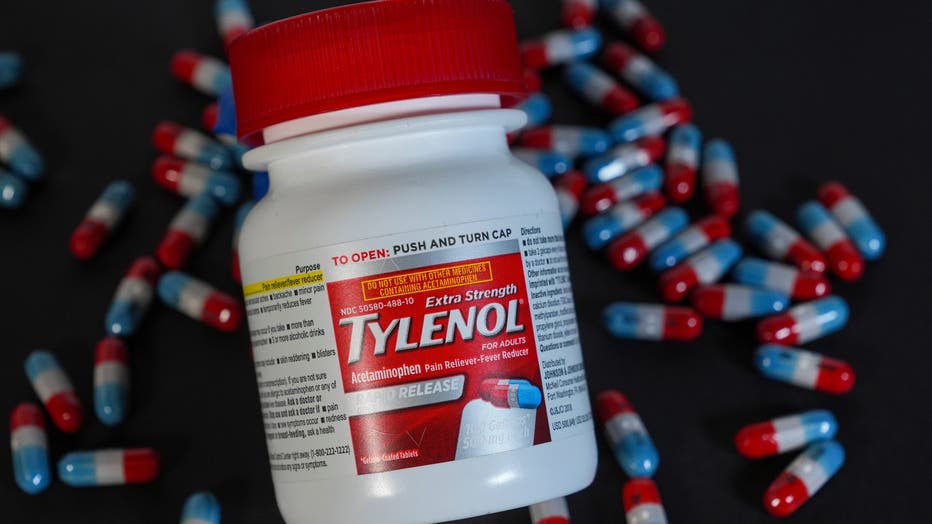WASHINGTON – President Donald Trump suggested on Monday that using acetaminophen during pregnancy could increase the chance of children developing autism spectrum disorder, a claim that has since garnered significant negative attention from medical leaders worldwide.
Acetaminophen is the active ingredient in Tylenol, and is a medication that’s used to help treat mild to moderate pain as well as reduce fevers.
The president recommended during a press conference at the White House that pregnant women should try to avoid the drug unless they “can’t tough it out.”
“Don’t take Tylenol,” Trump said. “There’s no downside. Don’t take it. You’ll be uncomfortable. It won’t be as easy, maybe. But don’t take it. If you’re pregnant, don’t take Tylenol.”
Trump additionally suggested that parents should space out vaccines given to their children, despite CDC recommendations.
“You just break it up into, I would say five, but let’s say four, four visits to the doctor instead of one,” Trump said.
Dig deeper:
The U.S. Food and Drug Administration (FDA) also announced on Monday that it would begin updating the label for acetaminophen. Now, the label will say that use by pregnant women “may be associated with an increased risk of neurological conditions such as autism and ADHD in children.”
Additionally, the FDA sent a letter to U.S. doctors that notes that their new recommendation should be “balanced with the fact that acetaminophen is the safest over-the-counter alternative in pregnancy among all analgesics and antipyretics.”
“To be clear, while an association between acetaminophen and autism has been described in many studies, a causal relationship has not been established and there are contrary studies in the scientific literature,” FDA Commissioner Marty Makary wrote.
In response to the Trump administration’s comments, Tylenol issued a statement saying that it is “one of the most studied medications in history.”
Tylenol also stressed that the medication is safe for pregnant women to use. In fact, the company said, high fevers and pain are widely recognized as potential risks to pregnancy if left untreated, suggesting that taking acetaminophen actually helps expectant mothers. Research from the National Center for Biotechnology Information confirms this.
“The facts remain unchanged: over a decade of rigorous research, endorsed by leading medical professionals, confirm there is no credible evidence linking acetaminophen to autism,” the statement reads. “We prioritize science as the core of how we provide care, and that will never change.”

Extra Strength Tylenol is shown in Carmel, Ind., Tuesday, Sept. 23, 2025. (AP Photo/Michael Conroy)
Medical community slams announcement
What they’re saying:
Several medical professionals have pushed back against the Trump administration’s announcement.
The American College of Obstetricians and Gynecologists President Steven Fleischman called the remarks at Monday’s press conference “not backed by the full body of scientific evidence.” He added in a statement that the remarks “dangerously simplify the many and complex causes of neurologic challenges in children.”
“Suggestions that acetaminophen use in pregnancy causes autism are not only highly concerning to clinicians but also irresponsible when considering the harmful and confusing message they send to pregnant patients, including those who may need to rely on this beneficial medicine during pregnancy,” his statement reads.
“The data from numerous studies have shown that acetaminophen plays an important—and safe—role in the well-being of pregnant women,” he added.
The American Psychiatric Association said in a statement that “autism is a complex disorder” and that “it is incorrect to imply that a handful of studies have established causation.”
“A strong base of evidence shows that acetaminophen, when taken as directed, is safe for use during pregnancy,” the statement reads. “Any decisions around a course of treatment should be determined by a patient and their doctor.”
Pushback abroad
The BBC reported on Tuesday that health officials in the U.K. do not share President Trump’s views on acetaminophen either; the drug is known as paracetamol in the region.
The U.K.’s health secretary, Wes Streeting, told ITV’s Lorraine Kelly that expectant mothers should not pay “any attention whatsoever” to Trump’s comments.
“I trust doctors over President Trump,” he said.
Steffen Thirstrup, chief medical officer of the European Medicines Agency, said in a statement that “[p]aracetamol remains an important option to treat pain or fever in pregnant women.”
“Our advice is based on a rigorous assessment of the available scientific data, and we have found no evidence that taking paracetamol during pregnancy causes autism in children,” he said.
World Health Organization spokesperson Tarik Jašarević said during a press briefing in Geneva on Tuesday that evidence of a link between using acetaminophen during pregnancy and developing autism remained inconsistent.
Australia’s chief medical officer also wrote in a statement that the country “joins with other global medicine regulators, leading clinicians and scientists worldwide in rejecting claims regarding the use of paracetamol in pregnancy, and the subsequent risk of development of autism in children.”
Mónica García Gómez, Spain’s health minister, has accused Trump of ignoring medical science, as well.
“Denialism not only destroys trust in science: it puts lives at risk,” she wrote on X.
The Source: The information above was sourced from POLITICO, The Cleveland Clinic, The Centers for Disease Control and Prevention, The U.S. Food and Drug Administration, The American College of Obstetricians and Gynecologists, the American Psychiatric Association, the BBC, Reuters, the United Nations, the Australian government and social media.


